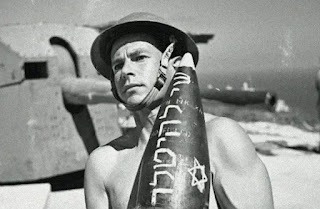THE ORIGINS OF GRANDMA'S ARMY - WWII
More than 40,000 Jews enlisted into the British Army during World War II to fight against the Nazis. Over 700 were killed during active duty. Throughout the war, Jews served in various positions.
Palestinian Jewish volunteers cooperated with British intelligence units and sent its personnel out on various commando missions in the Middle East. Another example of this cooperation was the dropping of 37 brave men and women (among them Hannah Szenesh), who volunteered to parachute into Nazi-occupied Europe. Their mission was: to gather intelligence; rescue Allied forces who had fallen into enemy territory; and try to save Jews in Europe.
Due to Arab opposition to the proposed Jewish homeland in
Palestine, the British initially refused to establish a separate fighting unit
of Jewish volunteers from Palestine. However, wartime manpower requirements and
the strategic need to defend the Middle East induced the British to permit the
formation of 15 Palestinian Jewish battalions. These units were incorporated
into the British army in September 1940.
After early reports of the Nazi atrocities of the Holocaust were
made public in 1942, British Prime Minister Winston Churchill sent a
personal telegram to U.S. President Franklin Roosevelt suggesting that “the
Jews ….of all races have the right to strike at the Germans as a recognizable
body”. Roosevelt replied later, saying “I
perceive no objection…”
It was not until September 20, 1944, however, that the British
government agreed to the establishment of a “reinforced brigade” which
would be fully trained, and then join the troops at the front. The Zionist flag was officially approved
as its standard. The Jewish Brigade included more than 5,000 Jewish
volunteers from Mandatory Palestine organized into three infantry
battalions of the Palestine regiment, and several supporting units. Some refugees
and “illegal” immigrants also joined the brigade, and some Jews serving in
British units were transferred to it.
Led by its initial commander, Brig. E.F. Benjamin, the soldiers of
the Jewish Brigade fought alongside troops of other nations. “Tough,
tanned and thirsting for revenge,” one military correspondent put it, “these
Jewish soldiers have something personal to fight for. Those who had been
tortured in Nazi concentration camps, survived to fight back. Many had lost
relatives, who were assumed to have been gassed and slaughtered.”
While the Jewish
people supported British efforts to fight against the Nazis, they could not
stand by while desperate Jewish refugees were denied entry into the country. “We
will fight the White Paper as if there is no war against Hitler,” declared
David Ben Gurion, prominent Haganah leader and Israel's first prime
minister, “and we will fight Hitler as if there is no White Paper.”
A Tennessee country boy in his youth, General McGill
stressed “never seen harder working farmers than the Jews...nor better farms.”
He described the modern cities in the country and factories “where from cleanup
forces to executives, all were Jewish.”
The Britains added, that “without Jewish
industries in Palestine, we could not have held out during the early years of
WWII."
The American general saw his Jewish brethren as superb fighters,
but he did not realise that this Jewish Brigade was the first
“world-accepted” entity of the State of Israel - which was to be born in 1948.
Skills gained in the Jewish Brigade, and in the British army
in general, were put to use during Israel’s War of Independence. More than its military value, however,
the Jewish Brigade served as a symbol of hope for renewed Jewish life in
Eretz Israel.



Comments
Post a Comment